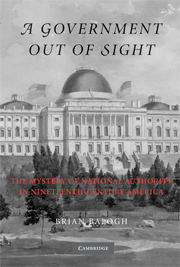Book contents
- Frontmatter
- Contents
- Acknowledgments
- 1 Introduction: Why Look Back?
- 2 How Americans Lost Sight of the State: Adapting Republican Virtue to Liberal Self-Interest
- 3 Between Revolutions: The Promise of the Developmental Vision
- 4 “To Strengthen and Perpetuate that Union”: Republican Political Economy
- 5 Outside the Boundaries: “Powers and Energies in the Extreme Parts”
- 6 The Uncontested State: Letters, Law, Localities
- 7 Restoring “Spontaneous Action and Self-Regulation”: Civil War and Civil Society
- 8 Judicial Exceptions to Gilded Age Laissez-Faire
- 9 “A Special Form of Associative Action”: New Liberalism and the National Integration of Public and Private
- 10 Conclusion: Sighting the Twentieth-Century State
- Index
7 - Restoring “Spontaneous Action and Self-Regulation”: Civil War and Civil Society
Published online by Cambridge University Press: 05 August 2012
- Frontmatter
- Contents
- Acknowledgments
- 1 Introduction: Why Look Back?
- 2 How Americans Lost Sight of the State: Adapting Republican Virtue to Liberal Self-Interest
- 3 Between Revolutions: The Promise of the Developmental Vision
- 4 “To Strengthen and Perpetuate that Union”: Republican Political Economy
- 5 Outside the Boundaries: “Powers and Energies in the Extreme Parts”
- 6 The Uncontested State: Letters, Law, Localities
- 7 Restoring “Spontaneous Action and Self-Regulation”: Civil War and Civil Society
- 8 Judicial Exceptions to Gilded Age Laissez-Faire
- 9 “A Special Form of Associative Action”: New Liberalism and the National Integration of Public and Private
- 10 Conclusion: Sighting the Twentieth-Century State
- Index
Summary
For most Americans living in the mid-nineteenth century it was not government, but rather civil society, that forged the nation. The market, religion, and America's unique history (which kept government at bay, they believed) created national unity. The Civil War severely tested those assumptions, at the same time that it propelled the consolidation of both the Union and Confederate states. Yet the dream of a nation united through economic, social, and religious ties died hard. Many of the public institutions created during the war were quickly swept aside.
This was not the case, however, in the voluntary and private sectors, where the Civil War proved to be a catalyst for national consolidation. A nationalizing economy quickly outgrew the locally oriented political structures that Americans fiercely reconstructed in the wake of the Civil War. Ultimately, the changes wrought by the market proved to be insurmountable. Class conflict and capitalist consolidation forced the hand of those who had hoped the nation was exempt from these historical forces. As we will see in Chapter 8, however, the very nature of the national market that emerged in the last third of the nineteenth century was, in no small part, the result of actions taken by a national legal infrastructure that even today remains largely out of sight.
“A DIVINE HARMONY BETWEEN PRIVATE ADVANTAGE AND THE PUBLIC GOOD”: BRINGING ORDER, NATURALLY
One reason that Americans eschewed the visible trappings of government was their abiding faith in a liberal system of exchange. Many believed that this was the real source of national social cohesion. Although they viewed the market as a natural phenomenon, most Americans were also convinced that their form of governance was exceptionally poised to maintain the delicate balance between market and polity.
- Type
- Chapter
- Information
- A Government Out of SightThe Mystery of National Authority in Nineteenth-Century America, pp. 277 - 308Publisher: Cambridge University PressPrint publication year: 2009



